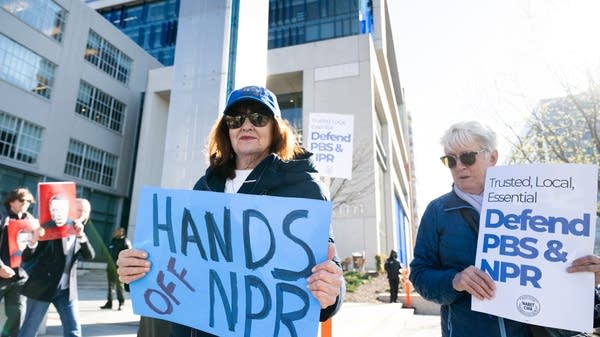ARTICLE AD BOX
A bill that would claw back $1.1 billion already allocated for public media now goes to the Senate for a vote, after passing the House Thursday. Unlike an earlier executive order that targeted public dollars spent on NPR and PBS, this bill would rescind funds from local public media stations, too.
In announcing the rescission package, the Trump administration’s Office of Management and Budget called the spending “wasteful.”
In Minnesota, that funding totals $17,228,752 across 16 organizations, from small stations including KMOJ in Minneapolis to MPR’s statewide network.
Greater Public in Minneapolis
Jazz88.FM in Minneapolis
KAXE-KBXE Northern Community Radio in Grand Rapids, Bemidji and Brainerd
KBFT Tribal Community Radio on the Bois Forte Reservation
KFAI in Minneapolis
KKWE Niijii Radio on the White Earth Reservation
KMOJ in Minneapolis
KOJB The Eagle on the Leech Lake Reservation
KSMQ Public TV in Austin
Lakeland PBS in Bemidji and Brainerd
MPR News, The Current and Your Classical statewide
PBS North in Duluth
Pioneer 90.1 Radio in Thief River Falls
Pioneer PBS in Granite Falls
TPT Twin Cities PBS in St. Paul
WTIP North Shore Community Radio in Grand Marais

Funding for public media has traditionally had bipartisan support, but calls to end it have gained traction in recent years, particularly among more conservative Republicans who say NPR and PBS news coverage has a liberal bias.
“NPR and PBS have increasingly become radical, left-wing echo chambers for a narrow audience of mostly wealthy, white, urban liberals and progressives,” Rep. Marjorie Taylor Greene of Georgia said at a Congressional hearing this spring.
Federal dollars are distributed to local stations by the Corporation for Public Broadcasting, a private nonprofit created by Congress in 1967 to ensure public access to non-commercial news and information, including emergency alerts.
On the White Earth Reservation and in its surrounding communities, those alerts — as well as cultural programming and reporting on tribal government news — could be at risk if the bill passes.
“Corporation for Public Broadcasting probably covers about 45 percent of our costs,” Maggie Rousu, general manager of KKWE Niijii Radio, told MPR News’ Morning Edition in May. “CPB funding pays one full-time staff. It also covers our emergency broadcast system. It covers some of our programming.”
In north-central Minnesota, Lakeland PBS provides national programming and local news each weeknight to about 490,000 viewers — all in cities and towns with populations under 20,000.
“Without Lakeland PBS, many residents in its coverage area would have no access to television covering local issues,” the station says in a lawsuit challenging the May executive order on PBS funding.
About 37 percent of its operating budget comes from federal grants awarded by CPB. Lakeland CEO Jeff Hanks said finding local funding to replace those CPB dollars is a challenge.
“The real problem for us is we’re truly one of those small-market stations,” he told MPR News’ Morning Edition in May. “We serve a lot of small, low-income communities up here in north-central Minnesota. There are a lot less private resources to draw from, less businesses, less people with higher incomes up here in this area.”

A smaller proportion — about 6 percent — of MPR’s budget comes from the CPB. The majority of funding for MPR News, The Current and Your Classical comes from member support.
But cuts to federal funding for public media could impact MPR programming directly. They could also affect programming indirectly by straining the budgets of stations in other states that pay for content from MPR and its parent company, American Public Media. If stations can’t afford to air programs like Marketplace or The Splendid Table the revenue loss could be felt across all APM brands.
“This vote moves us one step closer to the dismantling of the public media system as we know it,” said MPR President Duchesne Drew in a statement about the House vote to rescind CPB funding. “If rescission next passes the Senate, hundreds of public media stations will very likely go dark. That means people in rural and underserved communities will no longer have access to local, independent journalism.
“It is now up to the Senate to protect the news, storytelling, music and emergency alert systems 95 percent of the country depends on,” he continued.
The Senate has 45 days from Trump’s request on June 3 to act on the bill. In addition to public media funding, the bill would cut $8.3 billion to foreign aid programs addressing global public health, international disaster assistance and hunger relief.
Editor’s note: MPR receives money from the Corporation for Public Broadcasting. When reporting on the business of MPR and public media, we do so independently from news executives and do not let them review material before it runs.






 English (US) ·
English (US) ·